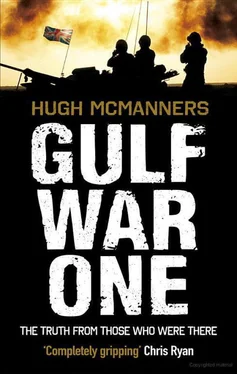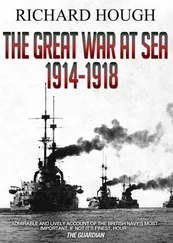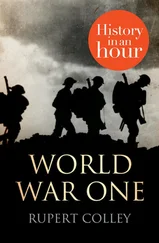Hugh McManners

THE TRUTH FROM THOSE WHO WERE THERE
In 1990 I was the Commander of the British armoured division sent to the Gulf, as part of the coalition force in Saudi Arabia, which would ultimately fight Saddam Hussein’s army and liberate Kuwait. As Commander, my view of the events of the war was influenced particularly by three factors. First, there was the need to acquire, organise and train the forces I was allocated into a fighting formation, capable of defeating the enemy in such a way that we played to our strengths and guarded our weaknesses. Second, was that being located in the desert I was to a large extent isolated; from the rest of the British Army, Whitehall, UK politics, and from the reporting in the media – and so the British public’s perception of the crisis and what we were doing. The last factor was my position in the chains of command. I was firmly linked and subordinate to the US chain of command as far as the tactical battle was concerned, and at the same time part of and dependent upon the British Army for logistical support and direction as to the part we were to play and the risks we were to take, all the while being responsible for leading my command of some 15,000 men and 7,000 vehicles to achieve our specific objective.
Reading the accounts in Gulf War One from some of those who were engaged in this great endeavour has been informative and given me pleasure. They give a consistent picture of the rapid scramble to find the necessary manpower, equipment and sufficient spares to deploy a viable force, the uncertainty we experienced as to what this force was to achieve, and how, and our growing confidence as we realised we could do it.
Although on arrival in the Gulf we had a great deal of training and organising to do before we were ready for battle we were not poorly trained – we could not have accomplished what we did if this had been the case. However, our training had become too narrowly focused on the anticipated defensive battle in north-west Germany that was part of the Cold War deterrence. To keep expenditure on defence as low as possible, the quantity and nature of our equipment had also become centred solely on acquiring only what could be justified against the requirements of the anticipated battle in Germany. So those deployed at the end of 1990 suddenly found that their training and experience was scarcely relevant and the inadequacies of their equipment became increasingly evident.
To their great credit, the men and women deployed rose to the occasion. Considerable initiative and imagination was shown, old lessons were re-learnt and adaptations made. The professionalism and resourcefulness of the vast majority of those I saw was of a high order, as is illustrated in this book. As we began to work together in the desert so the confidence within the team grew. This was largely as people saw the array of our own and allied forces, and were assured that our organisation and logistics did work and were improving all the time. In this regard the Royal Engineers, the logisticians and the Royal Electrical and Mechanical Engineers were absolutely critical to our success whether in the field or at the port. We were supported by them wherever we went. We also had the Royal Navy standing by, and if, at any point, our overland communications had been broken by enemy action I would have relied on their support.
I understand why the Navy appears little in these pages, but I would like to give them special mention as their considerable part in this combined endeavour is not generally and fully recognised. It was the Royal Navy who led the combined fleet based on the US Navy Carrier Battle Groups up the Persian Gulf towards Kuwait. It was they whose armed helicopters sank about half of Iraq’s navy and defeated the missile attack on the US battleships. And, not long after I had established my HQ to the north of the city, the first ship to dock in Kuwait was a Royal Navy frigate; a lucky few of the division had their first hot show for weeks. The artillery is the other organisation that I would like to highlight. Their effect on the enemy was not anticipated by many before the event, and I do not think it is widely understood even now. When forming the force that was to take on the Iraqi army I asked for and was given a substantial artillery component. My US Corps Commander reinforced the division further, allocating me a US artillery brigade. The weight of high explosive we were able to bring to bear on the target was thirty times more artillery power than a commander of a Second World War armoured division would have had at his disposal. That I could use this great force as I wished was a considerable advantage, and I could always call for more firepower, from our artillery or via air attack if needed. The Royal Regiment of Artillery did an outstanding job. For example, one unit was reequipped with the M109, a medium gun, and another received the new MLRS rocket system only days before the land battle began. They learned how to use these weapons as they deployed, whilst at the same time working out the tactics of their use with the Americans. They would lead us into battle, with shattering effect.
The different view points that exist between the commander or his staff and the soldier on the ground has been a characteristic of command in battle ever since armies were bigger than a few hundred men. Indeed, if people at different levels do not have different points of view – or see things from different perspectives – then someone, usually the superior, is not doing his job properly; he should be seeing a bigger picture. To have this disparity work to advantage requires a strongly-held, common aim or objective, and absolute confidence in each other’s judgment.
In our modern multinational military endeavours the difference of perspective extends from the man on the ground back to the individual capitals of the allied states. This makes it very difficult to align the different perspectives to the required advantage. The politicians and senior military commanders in each capital are concerned about their national contribution to the operation, balancing the political reward they expect from committing the contribution against the political risk at home if things go badly. Each capital will have a different balance of reward and risk.
On the other hand, the multinational commander in the theatre of operations is concerned with the achievement of the aim of the operation itself, which is whatever all the states can agree on, balanced against the threats presented by his opponent – rather than the risks to particular national contingents. Subordinate to him, each national contingent commander in the field has to achieve the objective set him by the multinational commander in such a way that he puts his nation’s interest at least risk. The difficulties of aligning these viewpoints are aggravated because the multinational commander is often an unknown quantity in capital cities other than his own and his judgment is questioned as a result.
In the circumstances of this war in the Gulf, and as described in this book, we can see it took some time for the judgment of commanders in the field, both multinational and national, to be trusted and for objectives to become sufficiently aligned. Given the evidence of the more recent operations in the Balkans, where I was a multinational commander with many of the capitals showing a marked reluctance to allow their contingents to be risked in a fight, or Iraq and Afghanistan, we, Great Britain and our allies, have yet to work out how to function collectively so that this inevitable difference in perspective is not a source of friction and sometimes confusion.
Читать дальше













